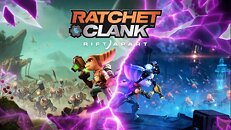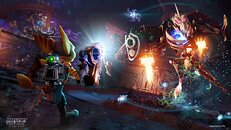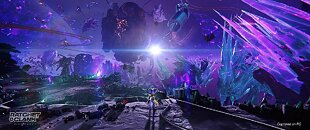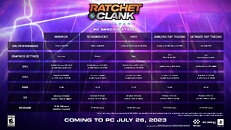T0@st
News Editor
- Joined
- Mar 7, 2023
- Messages
- 2,819 (3.72/day)
- Location
- South East, UK
| System Name | The TPU Typewriter |
|---|---|
| Processor | AMD Ryzen 5 5600 (non-X) |
| Motherboard | GIGABYTE B550M DS3H Micro ATX |
| Cooling | DeepCool AS500 |
| Memory | Kingston Fury Renegade RGB 32 GB (2 x 16 GB) DDR4-3600 CL16 |
| Video Card(s) | PowerColor Radeon RX 7800 XT 16 GB Hellhound OC |
| Storage | Samsung 980 Pro 1 TB M.2-2280 PCIe 4.0 X4 NVME SSD |
| Display(s) | Lenovo Legion Y27q-20 27" QHD IPS monitor |
| Case | GameMax Spark M-ATX (re-badged Jonsbo D30) |
| Audio Device(s) | FiiO K7 Desktop DAC/Amp + Philips Fidelio X3 headphones, or ARTTI T10 Planar IEMs |
| Power Supply | ADATA XPG CORE Reactor 650 W 80+ Gold ATX |
| Mouse | Roccat Kone Pro Air |
| Keyboard | Cooler Master MasterKeys Pro L |
| Software | Windows 10 64-bit Home Edition |
Next week, Ratchet & Clank: Rift Apart is launching on PC! Many of you have asked for details about the technologies used and system requirements. Today we are answering those questions, and on top of that, we have some exciting new feature announcements. To ensure a smooth dimension-hopping experience, our team implemented DirectStorage 1.2 in Ratchet & Clank: Rift Apart on PC, including GPU decompression.
Richard van der Laan, Senior Lead Programmer at Nixxes Software, explains: "To enable quick loading and instant transition between dimensions, the game needs to be able to load assets quickly. DirectStorage ensures quick loading times, and GPU decompression is used at high graphics settings to stream assets in the background while playing. Traditionally, this decompression is handled by the CPU, but at a certain point, there is an advantage to letting the GPU handle this, as this enables a higher bandwidth for streaming assets from storage to the graphics card. We use this to quickly load high-quality textures and environments with a high level of detail."



Principal Programmer Alex Bartholomeus: "For Ratchet & Clank: Rift Apart on PC, we added adaptive streaming based on live measurement of the available hardware bandwidth. This allows us to tailor the texture streaming strategy for the best possible texture streaming on any configuration. With DirectStorage, the use of a fast NVMe SSD and GPU decompression, this results in very responsive texture streaming even at the highest settings."
DirectStorage is developed to fully utilize the speed of fast PCIe NVMe SSDs, but the technology is also compatible with SATA SSDs and even traditional hard disk drives. This means Ratchet & Clank: Rift Apart on PC can use the same technology for loading data, regardless of the storage device in your system.
Ray-Traced Ambient Occlusion and XeGTAO
In our initial announcement, we shared that Ratchet & Clank: Rift Apart on PC will feature ray-traced reflections and newly added ray-traced shadows for natural outdoor light. Today we can reveal the addition of another option that will further enhance the realism of light in the game: Ray-Traced Ambient Occlusion, with various quality levels to choose from.
Graphics Programmer Menno Bil explains: "Ambient occlusion is a technique used in games to simulate how ambient lighting affects a scene. Ambient lighting is a form of indirect lighting: the light reflected from other surfaces. This effect mostly appears at creases, cracks, and corners where surfaces are close to each other. Commonly used AO techniques are SSAO (Screen Space Ambient Occlusion) and HBAO+ (Horizon-Based Ambient Occlusion). These are not very demanding on the hardware, but they do not provide physically accurate results. RTAO utilizes ray tracing further to enhance the realism of ambient occlusion in the game. We have implemented RTAO as an addition for those with high-end systems with ray tracing compatible hardware and processing power to spare."
Menno and the team also implemented XeGTAO, Intel's implementation of Ground-Truth Ambient Occlusion. Like SSAO and HBAO+, this solution is based on screen space. Therefore, this technique does not enable the level of realism that RTAO does, but the performance cost is much lower and comparable to that of the HBAO+ implementation. XeGTAO is selectable as an option in the game and works with graphics cards from all vendors.
"XeGTAO generates a very high-resolution ambient occlusion that shows even the smallest details in geometry," says Bil. "Overall, the output quality of XeGTAO is very high and results in a pleasant look."
System Requirements
Now that we have detailed all the features of Ratchet & Clank: Rift Apart for PC, it is time to tell you more about the system requirements. When making a PC version of a game, we put a lot of work into scalability. Additions like ray-traced shadows, ray-traced ambient occlusion, and triple-screen support are aimed at those with the latest and greatest hardware so they can push their systems. With highly customizable graphics and features, we make the game scale to less powerful systems to make it accessible for as many gamers as possible. Below is an overview of the recommended specifications for a variety of graphical presets.

While Ratchet & Clank: Rift Apart can be enjoyed using an HDD and the minimum system requirements, we encourage players to use an SSD in combination with the recommended system requirements or higher, to experience the game's signature dimension-hopping gameplay as originally intended. Details regarding ray tracing support for AMD GPUs coming soon.
View at TechPowerUp Main Site | Source
Richard van der Laan, Senior Lead Programmer at Nixxes Software, explains: "To enable quick loading and instant transition between dimensions, the game needs to be able to load assets quickly. DirectStorage ensures quick loading times, and GPU decompression is used at high graphics settings to stream assets in the background while playing. Traditionally, this decompression is handled by the CPU, but at a certain point, there is an advantage to letting the GPU handle this, as this enables a higher bandwidth for streaming assets from storage to the graphics card. We use this to quickly load high-quality textures and environments with a high level of detail."



Principal Programmer Alex Bartholomeus: "For Ratchet & Clank: Rift Apart on PC, we added adaptive streaming based on live measurement of the available hardware bandwidth. This allows us to tailor the texture streaming strategy for the best possible texture streaming on any configuration. With DirectStorage, the use of a fast NVMe SSD and GPU decompression, this results in very responsive texture streaming even at the highest settings."
DirectStorage is developed to fully utilize the speed of fast PCIe NVMe SSDs, but the technology is also compatible with SATA SSDs and even traditional hard disk drives. This means Ratchet & Clank: Rift Apart on PC can use the same technology for loading data, regardless of the storage device in your system.
Ray-Traced Ambient Occlusion and XeGTAO
In our initial announcement, we shared that Ratchet & Clank: Rift Apart on PC will feature ray-traced reflections and newly added ray-traced shadows for natural outdoor light. Today we can reveal the addition of another option that will further enhance the realism of light in the game: Ray-Traced Ambient Occlusion, with various quality levels to choose from.
Graphics Programmer Menno Bil explains: "Ambient occlusion is a technique used in games to simulate how ambient lighting affects a scene. Ambient lighting is a form of indirect lighting: the light reflected from other surfaces. This effect mostly appears at creases, cracks, and corners where surfaces are close to each other. Commonly used AO techniques are SSAO (Screen Space Ambient Occlusion) and HBAO+ (Horizon-Based Ambient Occlusion). These are not very demanding on the hardware, but they do not provide physically accurate results. RTAO utilizes ray tracing further to enhance the realism of ambient occlusion in the game. We have implemented RTAO as an addition for those with high-end systems with ray tracing compatible hardware and processing power to spare."
Menno and the team also implemented XeGTAO, Intel's implementation of Ground-Truth Ambient Occlusion. Like SSAO and HBAO+, this solution is based on screen space. Therefore, this technique does not enable the level of realism that RTAO does, but the performance cost is much lower and comparable to that of the HBAO+ implementation. XeGTAO is selectable as an option in the game and works with graphics cards from all vendors.
"XeGTAO generates a very high-resolution ambient occlusion that shows even the smallest details in geometry," says Bil. "Overall, the output quality of XeGTAO is very high and results in a pleasant look."
System Requirements
Now that we have detailed all the features of Ratchet & Clank: Rift Apart for PC, it is time to tell you more about the system requirements. When making a PC version of a game, we put a lot of work into scalability. Additions like ray-traced shadows, ray-traced ambient occlusion, and triple-screen support are aimed at those with the latest and greatest hardware so they can push their systems. With highly customizable graphics and features, we make the game scale to less powerful systems to make it accessible for as many gamers as possible. Below is an overview of the recommended specifications for a variety of graphical presets.

While Ratchet & Clank: Rift Apart can be enjoyed using an HDD and the minimum system requirements, we encourage players to use an SSD in combination with the recommended system requirements or higher, to experience the game's signature dimension-hopping gameplay as originally intended. Details regarding ray tracing support for AMD GPUs coming soon.
View at TechPowerUp Main Site | Source
